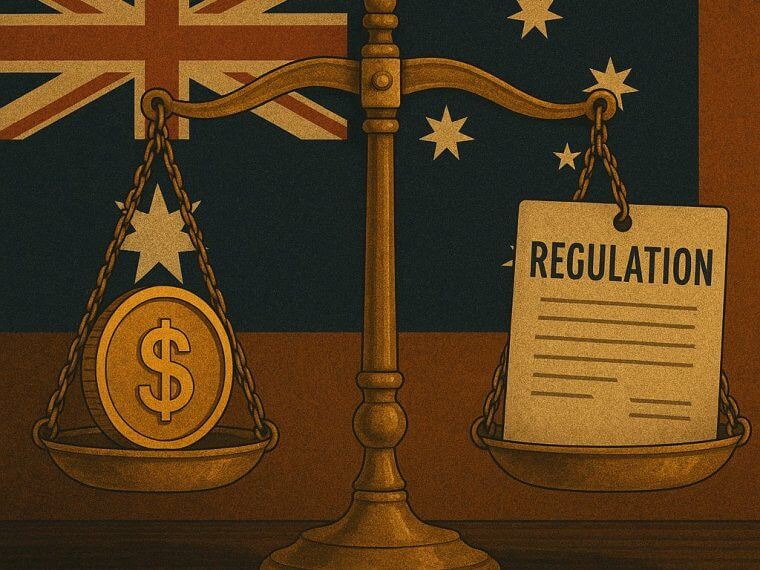De Australische toezichthouder ASIC zet een belangrijke stap richting duidelijkere regels voor digitale assets. Het heeft aangekondigd dat stablecoin intermediairs niet langer een aparte licentie nodig hebben om stablecoins te distribueren, zolang deze worden uitgegeven door aanbieders met een Australian Financial Services (AFS) licentie. Dit is de eerste keer dat... Het bericht Australië zet stap richting duidelijkheid in stablecoin regulering verscheen het eerst op Blockchain Stories.De Australische toezichthouder ASIC zet een belangrijke stap richting duidelijkere regels voor digitale assets. Het heeft aangekondigd dat stablecoin intermediairs niet langer een aparte licentie nodig hebben om stablecoins te distribueren, zolang deze worden uitgegeven door aanbieders met een Australian Financial Services (AFS) licentie. Dit is de eerste keer dat... Het bericht Australië zet stap richting duidelijkheid in stablecoin regulering verscheen het eerst op Blockchain Stories.
Australië zet stap richting duidelijkheid in stablecoin regulering
2025/09/19 01:24

De Australische toezichthouder ASIC zet een belangrijke stap richting duidelijkere regels voor digitale assets. Het heeft aangekondigd dat stablecoin intermediairs niet langer een aparte licentie nodig hebben om stablecoins te distribueren, zolang deze worden uitgegeven door aanbieders met een Australian Financial Services (AFS) licentie. Dit is de eerste keer dat...
Het bericht Australië zet stap richting duidelijkheid in stablecoin regulering verscheen het eerst op Blockchain Stories.
Clause de non-responsabilité : les articles republiés sur ce site proviennent de plateformes publiques et sont fournis à titre informatif uniquement. Ils ne reflètent pas nécessairement les opinions de MEXC. Tous les droits restent la propriété des auteurs d'origine. Si vous estimez qu'un contenu porte atteinte aux droits d'un tiers, veuillez contacter service@support.mexc.com pour demander sa suppression. MEXC ne garantit ni l'exactitude, ni l'exhaustivité, ni l'actualité des contenus, et décline toute responsabilité quant aux actions entreprises sur la base des informations fournies. Ces contenus ne constituent pas des conseils financiers, juridiques ou professionnels, et ne doivent pas être interprétés comme une recommandation ou une approbation de la part de MEXC.
Partager des idées
Vous aimerez peut-être aussi
If the dollar collapses, will Bitcoin win?
The rapid decline of the US dollar has rekindled the dream of "super-Bitcoinization" among Bitcoin supporters. But there is little evidence that the dollar's demise spells victory for Bitcoin, and instead plenty of signs pointing to widespread societal dislocation. The Death of the Dollar: Lessons from Currency Collapses Fernando Nikolic, a former vice president of Blockstream who experienced Argentina's financial turmoil, warned that Bitcoin believers who hope for the demise of fiat currency don't know what they are expecting. "Bitcoiners celebrating the collapse of the dollar don't understand what they're asking for... This isn't liberation, this is your grandmother having to eat cat food because her savings evaporated... The demise of the dollar is not a victory for Bitcoin." In a period of true monetary collapse, basic necessities like water and food (not digital assets) would become the only things with real value. Many Americans who fantasize about a sudden transition to a Bitcoin economy have never experienced a true societal collapse. Nickrich warned that the reality is far more chaotic than they imagined and they would not actually welcome the expected demise of the dollar. The bleak picture across the United States points to a stressed fiat currency system The U.S. housing market has never been more unaffordable. Median single-family home prices in 2025 hit a record high, requiring double the income of 2019. The price-to-income ratio has reached an all-time high, homeownership has fallen to an all-time low, and millions of renters are spending 30% to 50% of their income on rent. The imbalance between wages and rising housing costs means that most potential homebuyers are locked out of the market, and social pressures continue to mount. To make matters worse, the U.S. unemployment rate rose slightly to 4.3% in August 2025, the highest level since the end of 2021, and the broader underemployment rate reached 8.1%. The figures mask the pain caused by a labor market that has failed to keep pace with inflation or by stagnant real wages. Against the backdrop of rising unemployment and house prices, the U.S. national debt exceeded $37 trillion in August 2025, more than twice the size of the country's economy. Borrowing costs continue to rise, with interest payments on the national debt exceeding even defense spending. The Congressional Budget Office projects that debt levels will reach that milestone five years earlier than originally planned due to increased borrowing and social spending during the pandemic. Debt growth of $1 trillion every five months is unsustainable and could push up interest rates and squeeze investment. When Fiat Fails, Bitcoin Doesn’t Automatically Win The US dollar index has fallen more than 10% against major currencies this year, its steepest decline since 1973. This decline has been linked to unpredictable economic policies, protectionism, and expansionary tax cuts. As the dollar depreciates, import prices rise, the purchasing power of ordinary Americans decreases, inflation worsens, and household budgets are strained. Depreciation further puts pressure on housing, employment and debt, exacerbating systemic vulnerabilities. All of these grim indicators paint a bleak picture of the fundamentals of the U.S. economy, and the U.S. dollar is often seen as a barometer for the rest of the world’s economies. If the world’s strongest currency is under pressure, what does that mean for the entire fiat currency system? While many Bitcoin advocates cry out that “Bitcoin can solve this problem,” hyperbitcoinization—the idea that people will massively turn to Bitcoin when fiat currencies fail—is a dangerous fantasy. This view ignores historical and social realities: when currencies collapse, trust evaporates, and abstract ideals are replaced by basic survival needs. Nikolic, whose experience was rooted in the collapse of Argentina's fiat currency, testified that the hope of so-called "liberation" was naive: the collapse meant only poverty, instability and suffering. When social safety nets and market norms break down, financial dislocations hit the vulnerable hardest. Bitcoin may offer an alternative to inflationary fiat currencies, but the demise of the dollar will bring not freedom but disaster and suffering to most people.
Partager
PANews2025/09/22 17:00
Partager

Bitcoin and Ethereum prices to crash after FOMC, top analyst warns
A popular analyst has predicted that Bitcoin, Ethereum, and the crypto market could crash after the Federal Reserve starts cutting interest rates on Wednesday. Top expert predicts Bitcoin and Ethereum prices to cash In an X post, Ash Crypto, a…
Partager
Crypto.news2025/09/18 02:13
Partager

Top 3 Cryptos to Invest in Now Before They Hit $1
The race to find the next crypto to explode under $1 is heating up as the 2025 bull run builds up steam. Cardano (ADA) continues to be in the spotlight with its steady network upgrades, and Dogecoin (DOGE) continues to have pull with its massive community and cultural relevance. Yet the real hype is for […]
Partager
Cryptopolitan2025/09/22 17:30
Partager